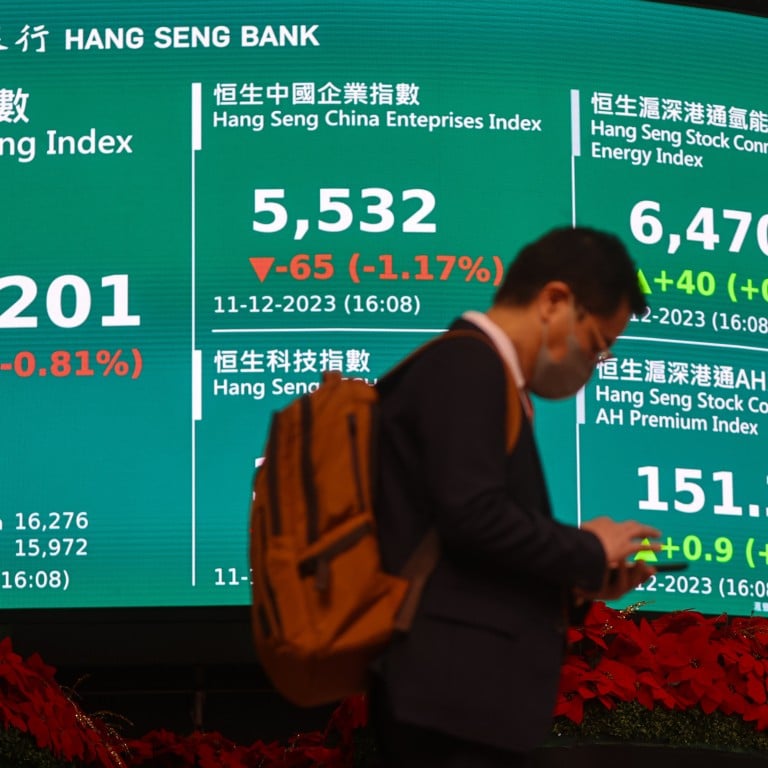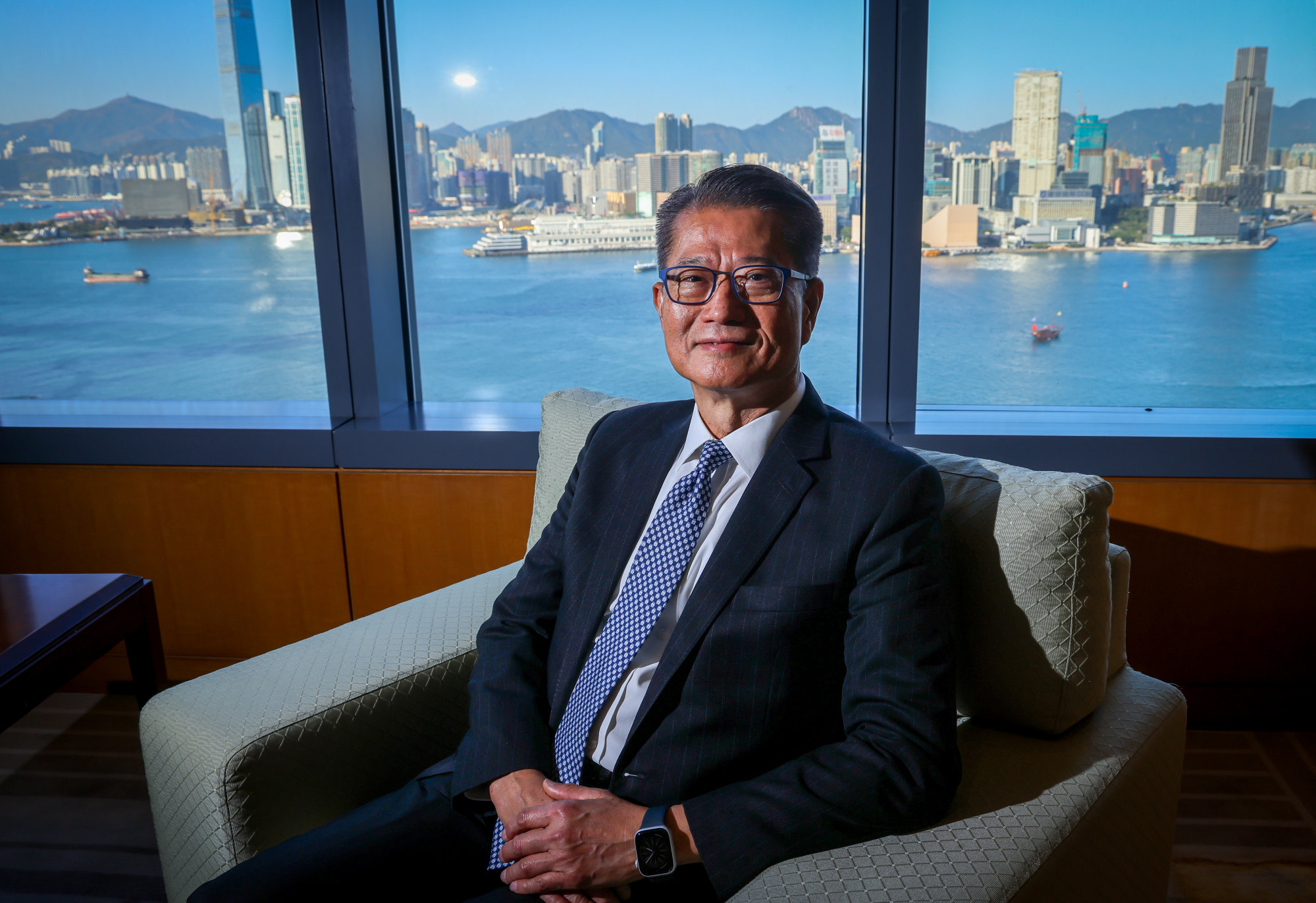
Hong Kong remains an ‘ideal option’ for international investment despite asset market pressures, finance chief says ahead of Davos
- Investment opportunities have become more attractive despite high global interest rates, finance chief Paul Chan says
- Chan’s positive assessment comes amid a four-year slump in the city’s stock market and wider economic malaise
Hong Kong remains one of the “most ideal options” for international investment despite pressure on asset markets, the finance chief has said, pointing to an ongoing net inflow of funds into the city.
“It is true that in the face of the global high interest rate environment and multiple external adverse factors, Hong Kong’s asset market has been under pressure in the past year,” Chan said.
“However, it is also true that investment opportunities have become more attractive, and many funds are waiting for chances to look for investment opportunities.”

In the first 11 months of 2023, total deposits reached HK$16 trillion (US$2.04 trillion), a year-on-year increase of 4.1 per cent, of which deposits in Hong Kong dollars rose by 1.7 per cent year-on-year to HK$7.6 trillion, Chan added.
Taken together with preliminary figures from December, the total growth in deposits last year was expected to reach 5 per cent, the minister said.
Chan also noted that HK$250 billion entered the Hong Kong market last year through the Southbound Stock Connect scheme.
“The figures reflect that between entry and exit, funds are still in a state of ‘net inflow’,” he said.
The Stock Connect scheme, which links Hong Kong’s bourse with those of Shanghai and Shenzhen, allows investors in those places to trade on each other’s stock markets. The southbound link allows mainland investors to buy and sell eligible shares listed on Hong Kong’s exchange.
Chan’s positive assessment comes amid a four-year slump in the city’s stock market, and wider economic malaise despite earlier hopes of a post-pandemic rebound.
The Hang Seng Index was down about 13.8 per cent in 2023, according to its year-end report, marking its fourth straight year of decline. It also had its worst start to the year since 2016, as a slowdown in mainland China’s growth and longer-than-expected policy tightening in the US continued to hurt sentiment.
Hong Kong may take ‘year or two’ extra to achieve budget surplus, Paul Chan says
Housing prices have also fallen to their lowest in seven years, down about 20.6 per cent from the market’s peak in September 2021, as the city’s slowing economy and high interest rates undercut demand.
But Chan said international investors sought out the most “cost-effective return opportunities” and thus were not focused on “past numbers”, but rather “potential for future growth”.
“Many international investors who are familiar with the Hong Kong market agree that the city is one of the most ideal options,” he said.
The finance chief added that Hong Kong’s wealth management sector had “great advantages”, pointing to a 2023 report by US-based Boston Consulting Group which estimated that the city would experience a 7.6 per cent growth rate per year in the industry between 2022 and 2027.
He also highlighted efforts to diversify the city’s economy, including the “vigorous promotion” of innovation and technology industries, including in artificial intelligence, data science and biomedicine.
Buyers opt for cheaper homes in Hong Kong’s first 2024 weekend sales
Gary Ng Cheuk-yan, a senior economist with Natixis Corporate and Investment Bank, said that while the net inflow of funds was a “positive sign”, the figures could be partly attributed to the “growth effect” of high interest rates making Hong Kong dollars more attractive to some investors.
“It is only one of the important aspects when we assess Hong Kong’s investor sentiment,” Ng said. “We cannot only look at that and say that everything is fine.”
He pointed to the poor performance of the wider financial markets and housing prices as other key factors, describing investor sentiment in those areas as “clearly not that great”.
“There are still quite a few challenges,” he said.
But Terence Chong Tai-leung, the executive director of the Chinese University of Hong Kong’s Lau Chor Tak Institute of Global Economics and Finance, said the data showed capital was remaining in the city.
Chong added that he anticipated the housing and stock markets would rebound once the US began lowering interest rates, and that the city would benefit from increased investment from Southeast Asia and the Middle East.
900 technology companies drawn to Hong Kong amid city’s innovation drive
“We are still very confident about the future of Hong Kong as a financial centre,” he said.
In his blog, Chan said he would introduce and promote the city’s developments at the summit in Davos this week.
The annual event brings together public officials, business leaders and civil society groups from around the world. This year’s meeting runs from January 15 to 19 under the theme of “Rebuilding Trust”.
“I hope that everyone will strengthen cooperation and achieve better economic growth together,” Chan said.
Secretary for Commerce and Economic Development Algernon Yau Ying-wah will join parts of the summit, along with Airport Authority chairman Jack So Chak-kwong, Hong Kong Exchanges and Clearing chairwoman Laura Cha Shih May-lung and MTR Corporation CEO Jacob Kam Chak-pui.

